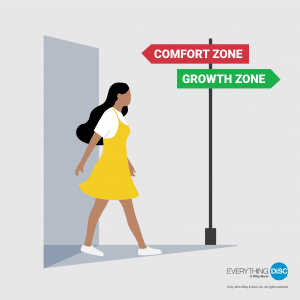Knowing one’s own DiSC® style, or that of another, can help you be aware of what situations might cause stress and how you might respond. While this article was originally written in response to the COVID-19 restrictions, it has been updated and can apply to stresses caused by major changes such as illness, injury, military deployment, job change or loss, death of a loved one, marital separation, incarceration, or retirement.
You might notice the S style retreating from social situations when they’re stressed out. They may be absorbing the stress of others while pushing their own to the side. S styles, especially those with i tendencies, are often empathetic, which can be difficult when they see many people suffering. An S-type person under stress may appear withdrawn, passive, overwhelmed, inflexible, indecisive, or overly focused on details that seem unimportant to you.
What might be stressing to the S style?
S styles might be challenged by:
- disrupted routines at work and home
- uncertainties making it difficult to plan ahead
- having to multitask, especially if work-home divisions are blurred
- the energy it takes to be on video calls
- seeing people struggle and not being able to help
- having overcommitted, taken on too much at work and home
- not feeling innovative, when innovation is what is needed
- being unable to participate in their usual (and comforting) traditions or routines
- having to work more independently, making more decisions on their own with less feedback from others
- anything that challenges their core belief: I’m valuable if I’m accepted, if I can please.

What does the S style need during times of stress?
Reassurance: knowing which things are under their control that they can make good choices around
Harmony: freedom from tension, conflict, and ongoing stress
Direction: knowing where they are headed and what is expected of them
Tips for the S style
- Work on building your comfort with both conflict and making mistakes, two things that are normal and often healthy.
- Make plans for staying connected to friends and family; don’t wait for it to happen naturally. This may mean putting regular events on your calendar reminding you to text, call, or write someone. Reaching out because it’s an item on your to-do list doesn’t make your connection with that person less genuine.
- Find ways to volunteer and give back to your community (if you haven’t already overcommitted to volunteer work). Doing good for someone else can often recharge an S-style person’s battery.
- If you have overcommitted, find a way to take some things off your plate, even if it means temporarily disappointing someone else. And practice saying “no” to extra tasks when your to-do list is already full.
- You may be worried about bothering other people by asking for help. But being honest about your feelings can actually help others by normalizing their own feelings of stress and giving them a chance to help someone they care about (you!).
- If you have trouble speaking up or getting a word in during meetings, send a note to your team with ideas for making sure everyone who wants to speak gets to speak.
- Concrete, project-based tasks are comforting, and it feels good to check them off your list. But that might mean you procrastinate on bigger-picture or more creative aspects of your work that also need your attention. Block out time that is only for brainstorming and creative thinking.
- Is there a low-stress way for you to collaborate with one or a few people on a fun project? Maybe gather a couple of friends to do an easy craft together, or sign up for a short, low-commitment community ed class.
- Concentrate your attention on what you can do, not on what you can’t.
Tips for every style
- Get enough sleep. Try napping.
- Exercise as appropriate.
- Get outside. If you can’t get outside, look at images of outdoor beauty or get a few indoor plants.
- Stay connected and social in safe ways.
- Practice self-compassion.
- Stay (or become) grateful. Studies have shown that those who practice gratitude are more optimistic and have better relationships.
- Look for opportunities to laugh. This video of babies laughing is worth viewing.
- Ask for help if you need it. Now might be the time to reach out to a friend, a life coach, a therapist, or a help line.
- Learn more about yourself with Everything DiSC Workplace or build your emotional intelligence with Everything DiSC Agile EQ.
Here’s some perspective from the Buddhist monk Thich Nhat Hanh:
“Fear keeps us focused on the past or worried about the future. If we can acknowledge our fear, we can realize that right now we are okay. Right now, today, we are still alive, and our bodies are working marvelously. Our eyes can still see the beautiful sky. Our ears can still hear the voices of our loved ones.”

